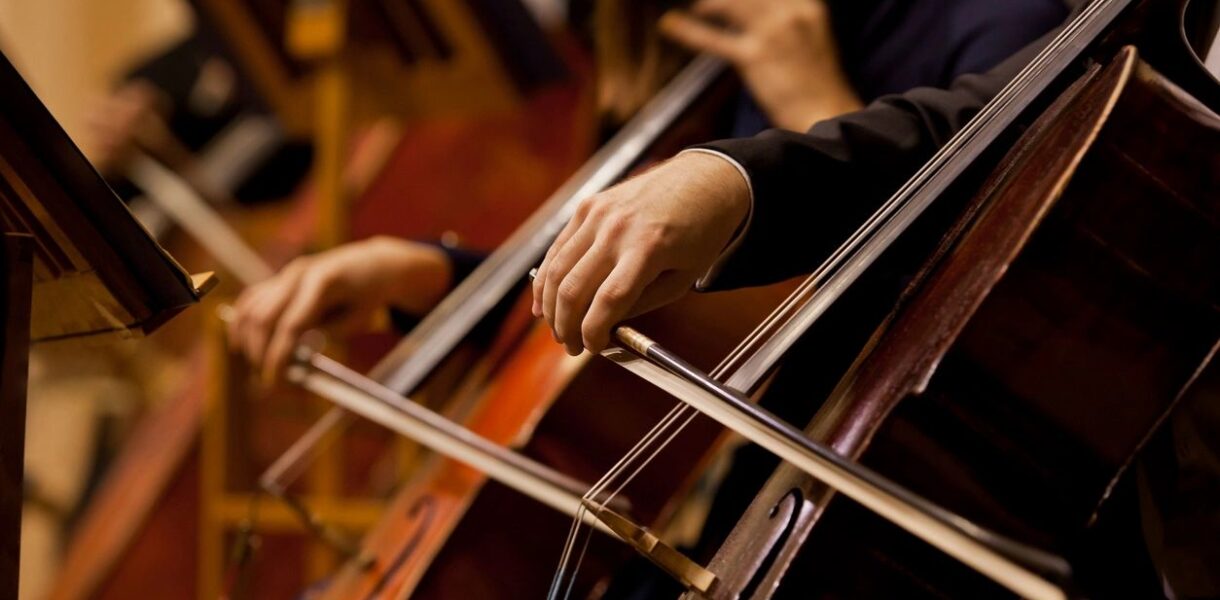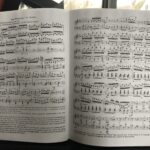We all know the feeling that no matter what you do, you’ll be overshadowed by someone else. It seems like hard work should always lead to success and recognition, but the truth is, it doesn’t. It’s part of my nature to want to be the best of the best at everything I do, but if distancing myself from society has taught me anything, it’s the importance of doing things for myself and not to please others. Sometimes I struggle with self esteem in my musical ability, because it means very much to me. It’s frustrating to see other people who don’t seem as dedicated appear to be “better” than me. And paradoxically, over the past few years I’ve noticed that as I improved drastically as a musician, I was less confident in my abilities because I was surrounded by more and more amazingly talented people. It’s so important to have people to look up to in whatever you do, but I felt as if I was not unique enough, and that I was the same as every other pianist or violinist I knew – and that’s still a struggle today. But since I’ve spent a lot of time dwelling on this topic myself, I thought I would share some of what I’ve learned and thought about so far.
An Illusion of Uniqueness
It’s important to address what uniqueness really is. To me, uniqueness is simply playing in a way that sounds like you. Uniqueness can easily be misinterpreted as a need to be different from all other people. But when you try to be different just to be different, this often violates what your true intention is! If you play in a way that’s true to yourself, sounding different from others will follow. Many musicians purposely do something out of the ordinary to sell their performance, especially in a competition format. Personally, I’m not a big fan of many competitions for this reason, since you may have to do something superficial in order to win the judges over. However, I can still see that competitions are important because they’re useful in launching careers and providing acknowledgement, and the winners are almost always very talented. But I think at a certain point when you’re competing against other very highly esteemed musicians, all who are talented in their own way, the judging relies heavily on a) personal preference and b) finding someone who stands out. This creates a culture where musicians are always encouraged to look for something that makes them unique from other people. However, this leads to some issues: for example, I find some musicians to be much too exaggerated and wild, like they’re putting on a show instead of listening to the value of the music.
Now, I’m not against being different. I just think that the very notion of “being different” promotes some sort of imposter syndrome, like you have shoes to fill that aren’t yours. What people need to realize is that we all are different already, so you don’t need to do something crazy to show that off! But as you learn and grow, you discover what you like and don’t like, and this all contributes to the style in which you play and how you play it. If you listen to Rubinstein, Heifetz, or du Pré, for example, you can see they each had a way of playing and interpretation that separated them from other musicians. But this wasn’t created by them throwing in some random hand gestures or unconventional technique. No, it was created from a lifetime of practice and listening, and from a deep maturity of musical thought. If you listen to each of them, you hear and see how into the music they are, and how they truly understand it. Heifetz’s brain processes the music differently from all other violinists, and his technique is different from all other violinists as well. So, he’s unique! And so are you! But of course it takes practice to transmit your musical ideas from your brain to your body, and to figure out what musical ideas you like in the first place.
Developing a Personal Style: Listening
I listen to so much music. Not only do I listen to music for the instruments I play, I regularly listen to solo, chamber, and orchestral music as well as concertos for a variety of instruments. Also, I’m always discovering interesting little pieces down the YouTube rabbit hole! While I’m not overly familiar with repertoire for winds and brass, I’m working on expanding my knowledge in these areas. I don’t usually listen to music while I’m studying or doing schoolwork because I get distracted, although I know some people are excellent at multi-tasking. But whenever you have a quiet moment, pick anything and listen to it. You may have your favorite musicians and recordings – I’m really loving Martha Argerich these days – but make sure to listen to other things as well! Most importantly, you should listen to a large variety of music to get a bigger picture of music as a whole. Consider branching out and listening to other genres in addition to classical, such as jazz or musical theater, and you’ll find all sorts of parallels. I only started really listening to music a couple of years ago, although I’ve been playing piano almost 10 years now! Before I began listening to music to the extent I do now, I liked almost every performance I could find, with no qualms about it: if the notes were played accurately, it sounded good to me. Now, I often search for hours and still can’t find a recording of some piece or another that satisfies me. I’m not trying to be picky or elitist, but I think that I’ve grown as a musician and my more specific tastes reflect that. I’m decisive in my musical ideas and better able to understand my thoughts. But I’m still surprised how many younger musicians I know that don’t actively listen to music, and never went to concerts or recitals. This has made all the difference because I’m more knowledgeable about my craft in and I feel like I’ve taken leaps ahead in the depth and quality of my playing. Besides, classical music keeps me company and I look forward to listening to it.
One exercise you can do in order to verbalize your musical opinions is to pick a piece and listen to many different interpretations of that piece by different musicians. For example, when I was working on Chopin’s second piano concerto, I must have listened to at least 10 different recordings. Listen very carefully, to all the details, and write down a bit about the character each performance brings and interesting things you noticed. Afterwards, consider what you thought of the character as a whole of each performance. You can even compare and contrast the smallest details – once you’ve listened to the same piece several times, you will discover so many interesting things in the music! Try to avoid writing down only that you like something, or that you don’t like something. Really focus on putting into words what about it you like or dislike. Additionally, this is an exercise in communication, because you’ll become more sensitive and responsive to advice in future lessons and masterclasses. This whole exercise helps you develop ideas of what your personal preferences are, but without closing your mind to one style.
Being open to change and practicing with intent
The notion of what you like and don’t like in music is subject to change, sometimes very often. Because here’s the thing: your personal style and interpretation are personal, and if you’re changing as a person then the incredibly individualized part of music must be changing too. Even just last year, I had a very different idea of what I liked. I used to enjoy the dramatic type of music, the one that gets you excited because it seems to have so many different things going on that all draw your attention in immediately. Recently, I’ve been enjoying more stoic renditions of the same pieces, because I think they are more powerful when they don’t give everything away. Remember: music is closest to your mind, not only your physical actions.
Because your personal style is changing, it’s important that you’re open-minded to change. It’s very easy to set habits for yourself, and slide into the same ways you’ve played for however many years. I recently stumbled upon a practice journal from 2012 in which my piano teacher had written “keep your foot on the ground while pedaling!” Eight years later, with a new teacher and light-years ahead in technique, I still struggle with lifting up my heel while I pedal, which makes an obnoxious sound and distracts from the music – a classic example of a long-lasting bad habit. The same goes with technique and application of technique: sometimes you get stuck in the same ruts, and you need to re-evaluate what you’ve been doing by allowing yourself to change what you’ve done in the past. Even if your past technique wasn’t bad, it still could use some updating, if only to grow with your new interpretations and ideas!
It’s fair to say that practice will help this, but not just any practice. Everyone has their own practice strategy, but I’ve seen that sometimes people’s practicing (including my own) is not as efficient and beneficial as it could be. It’s very important to practice not only technique and the notes, but phrasing, character, color, and interpretation as well. It’s something well-drilled into students’ minds that repetition is key, but repetition is also confining if done repeatedly in a simply repetitive way. For example, repeating that one line you struggle with 100s of times in the exact same way can make you feel close-minded, unaware of the other options for this phrase. Instead, once you’ve been able to make needed adjustment to this technique, repeat 100 times in a different way each time, experimenting with phrasing, articulation, dynamics, and more. Keep 10 or so ideas in mind that you like, and explore these as you practice!
I’ve spent a lot of time adjusting my technique so I can play in the way I want, especially on piano. One major thing I’ve struggled with in piano technique is having jumpy hands and arm movements that are too big. While practicing, I have to concentrate very carefully on keeping everything closer to the keys. I’ve also had to take a look at my hand structure, a topic that gives me much frustration, to reconfigure the sound I want. For violin, it’s the left hand double stop position and pressure on the fingerboard which is taking the most work to improve. But what I’m trying to say is if you want something to change, be open to changing it! Sometimes they’re small changes, which take a few minutes, and sometimes they’re big changes that take months or years to make. You can always improve, so you have to be okay with this being a never-ending journey (even the most famous musicians of our time are still improving)! But if your playing style seems right for you at the moment, don’t purposely mess up the way you play just to be unique, because you already are unique! No one else plays exactly like you. There are people who have influenced you, just as all of the great musicians were influenced by others. We’re always taught when we’re young that “we’re all different & special in our own ways,” yet as we grow many of us learn to reject this idea. It’s important to accept this and be open to change. Don’t worry, when you’re ready, you’ll let change come and you’ll make new discoveries on who you are as a musician.



